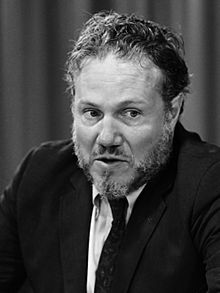Leslie Fiedler | |
|---|---|
 Fiedler in 1967 (Photograph: Jac. de Nijs) | |
| Born | March 8, 1917 Newark, New Jersey, U.S. |
| Died | January 29, 2003 (aged 85) Buffalo, New York, U.S. |
Leslie Aaron Fiedler (March 8, 1917 – January 29, 2003) was an American literary critic, known for his interest in mythography and his championing of genre fiction. His work incorporates the application of psychological theories to American literature.[1] Fiedler's best known work is the book Love and Death in the American Novel (1960). A retrospective article on Leslie Fiedler in the New York Times Book Review in 1965 referred to Love and Death in the American Novel as "one of the great, essential books on the American imagination ... an accepted major work." This work views in depth both American literature and character from the time of the American Revolution to the present. From it, there emerges Fiedler's once scandalous—now increasingly accepted—judgement that American literature is incapable of dealing with adult sexuality and is pathologically obsessed with death.[2]
Our great novelists, though experts on indignity and assault, on loneliness and terror, tend to avoid treating the passionate encounter of a man and a woman, which we expect at the center of a novel. Indeed, they rather shy away from permitting in their fictions the presence of any full-fledged, mature women, giving us instead monsters of virtue or bitchery, symbols of the rejection or fear of sexuality.
— Leslie Fiedler, Love and Death in the American Novel
- ^ Lehmann-Haupt, Christopher (January 31, 2003). "Leslie Fiedler Dies at 85; Provocative Literary Critic". The New York Times. ISSN 0362-4331. Retrieved May 26, 2020.
- ^ Fiedler, Leslie A. (2003) [1966]. Love and death in the American novel. Dalkey Archive Press. ISBN 1-56478-163-1. OCLC 949854980.